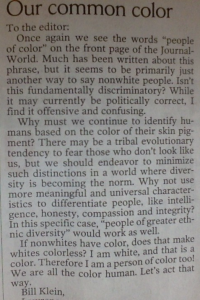This letter was published in edited form in the Lawrence Journal-World today. The original letter I was responding to is missing from the LJWorld website [update: they added it], so I’ve attached a photo here. Due to space constraints I left out a lot of things I wanted to say, mostly under the theme of “centering Whiteness” and the fragility of White feelings.

To the Editor,
In response to Bill Klein’s letter of January 17, 2020 “Our common color”.
Mr. Klein asks “why must we continue to identify humans based on the color of their skin pigment?” The answer is history. The phrase “people of color” evolved to describe a group of people who share a common experience of being systematically targeted for oppression, violence and exclusion by White people. The phrase is intentionally political and in reference to Whiteness. White people invented the idea of race, of Whiteness itself, to justify those violent, exclusionary systems. When White people say “color doesn’t matter” or “I don’t see color” they are in effect saying, I don’t see the system of violence that people who look like me created and continue to benefit from.
Like Mr. Klein, I am White. Like Mr. Klein, I used to think that it was morally advanced to try and ignore the color of a person’s skin, to instead focus on intangible internal qualities like intelligence, compassion and integrity that he mentions. Acting as if we are “colorblind” makes the problem of White supremacy worse, though, for three reasons. One, it ignores implicit bias, the attitudes and behaviors we live out unconsciously based on stereotypes we hold. Two, it makes honest racial dialogues impossible. Three, it erases the diverse lived experiences of people of color and White people. Colorblindness is, itself, a symptom of White privilege and White supremacy because only White people can afford to pretend it’s possible.
Now when I see our school board reflect the racial diversity of our community, I celebrate that we have taken one small step toward loosening the knot of exclusion and systemic racism that White supremacy tries to perpetuate. If folks like Mr. Klein are interested, our wonderful public library staff can help locate helpful reading material on this topic.